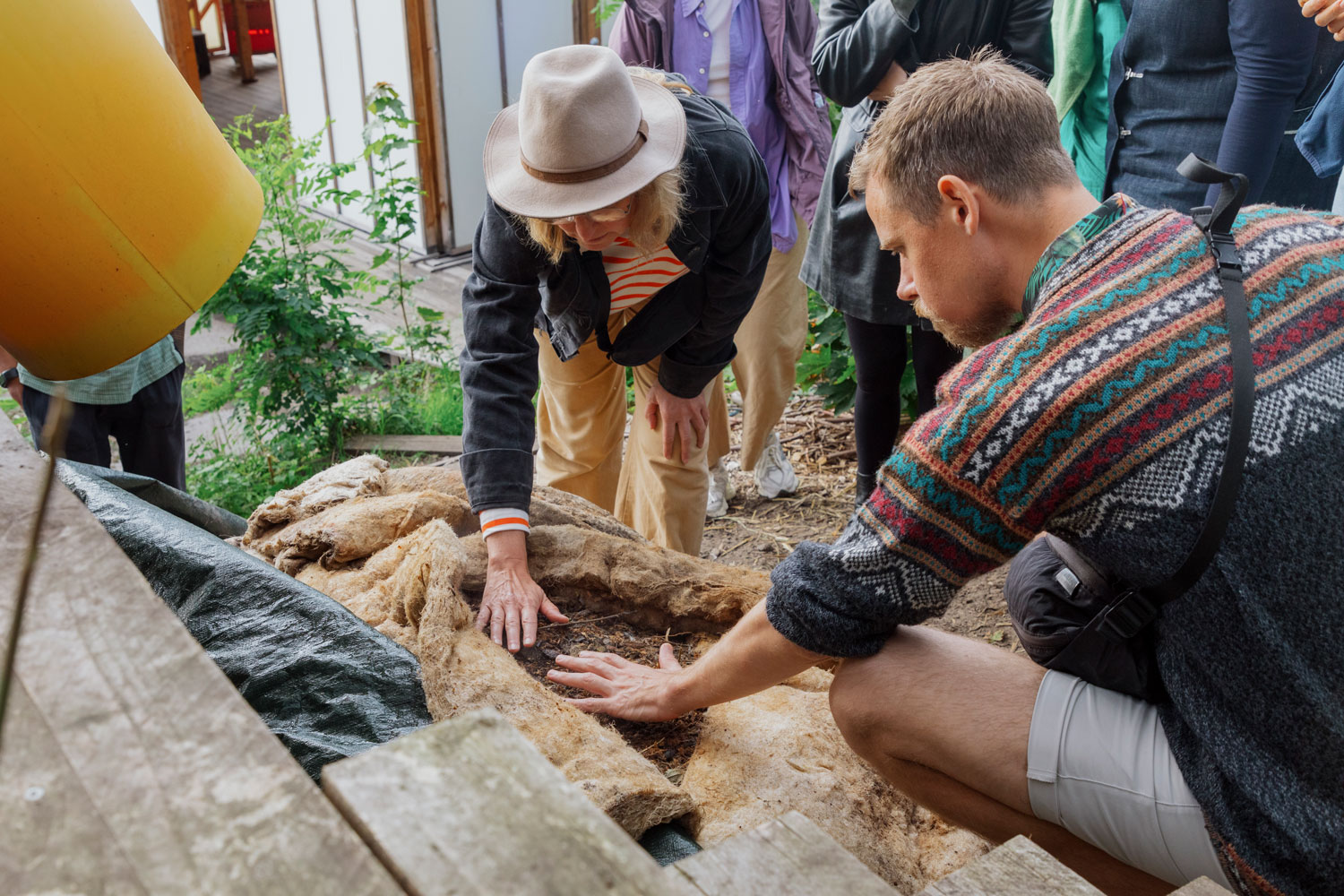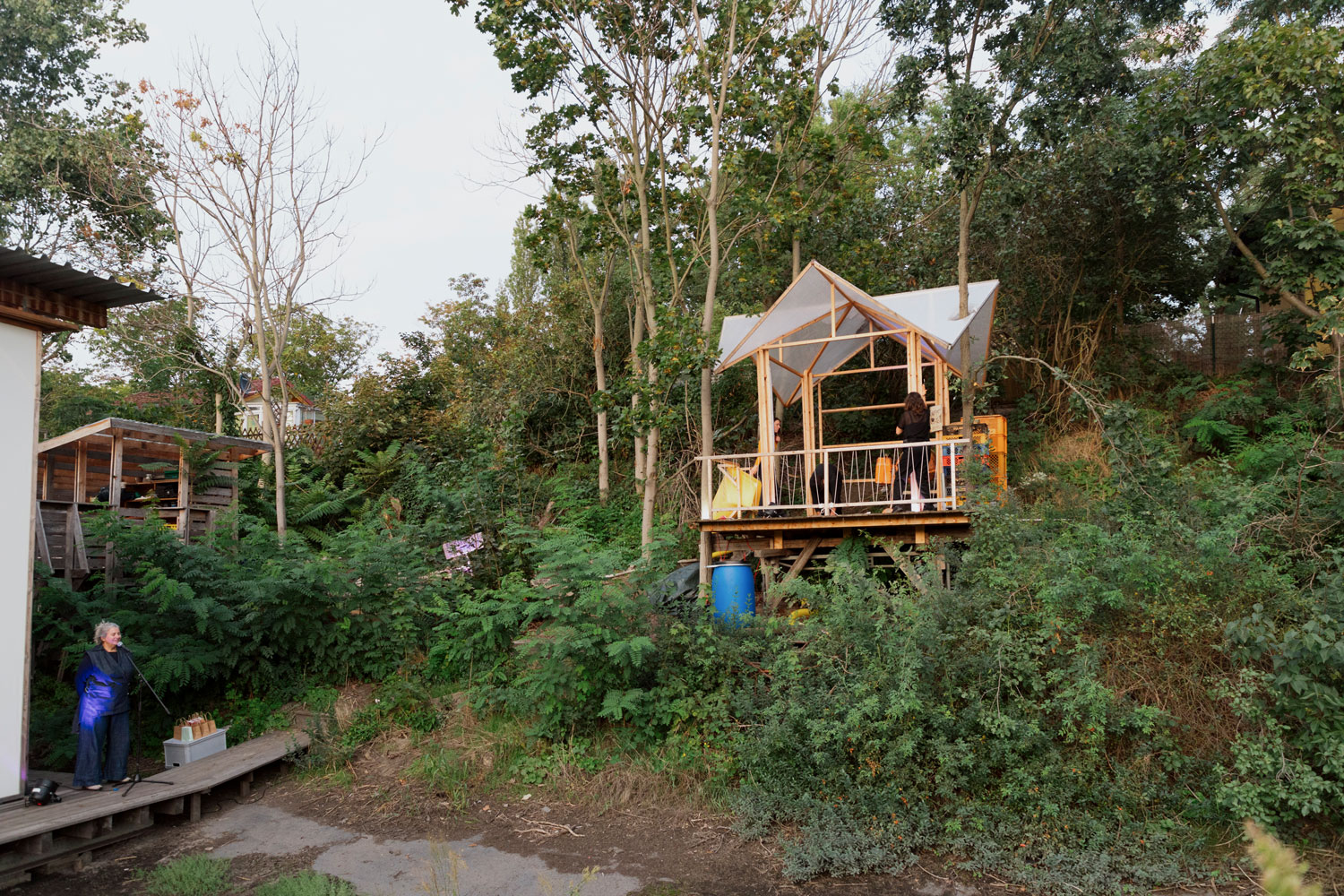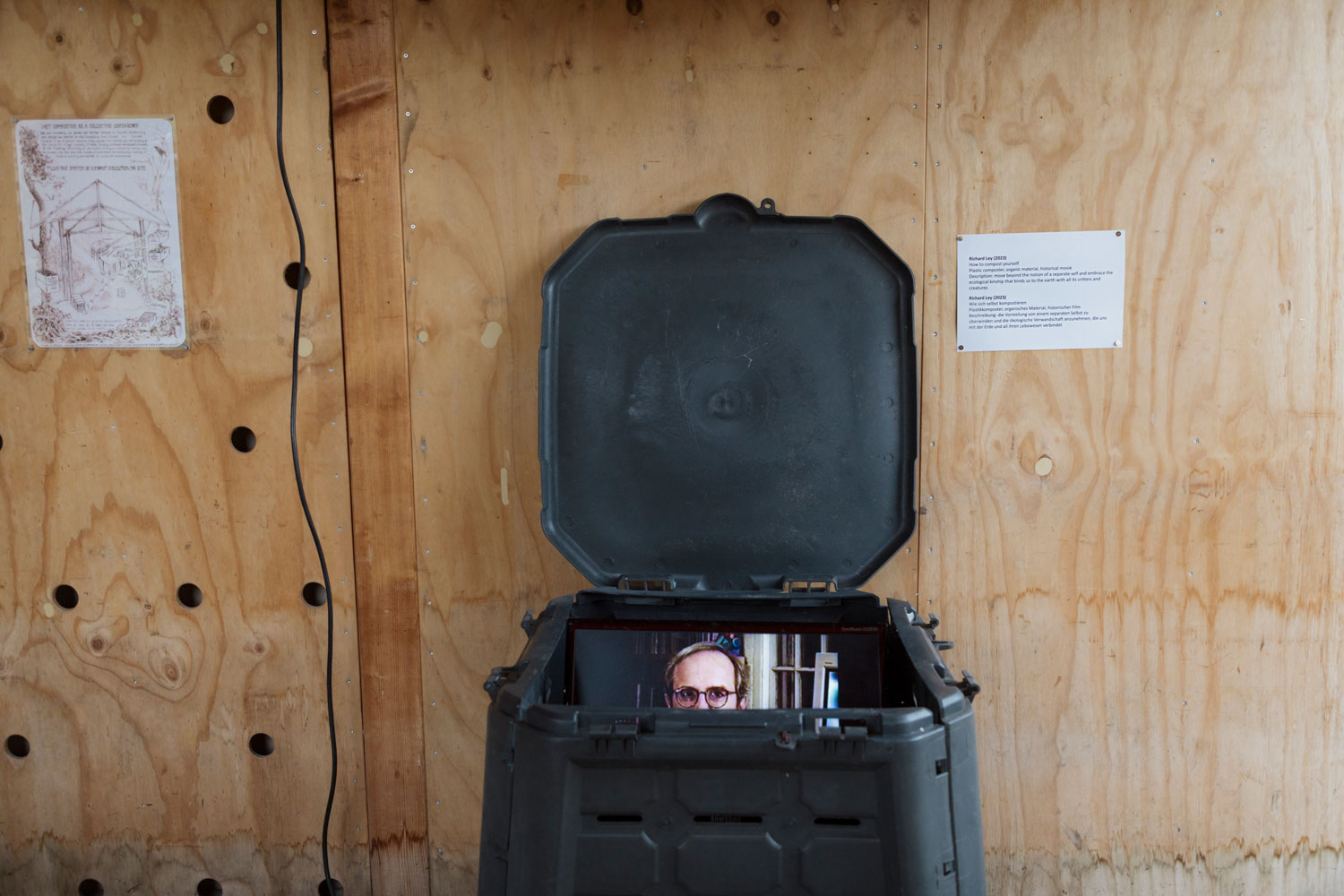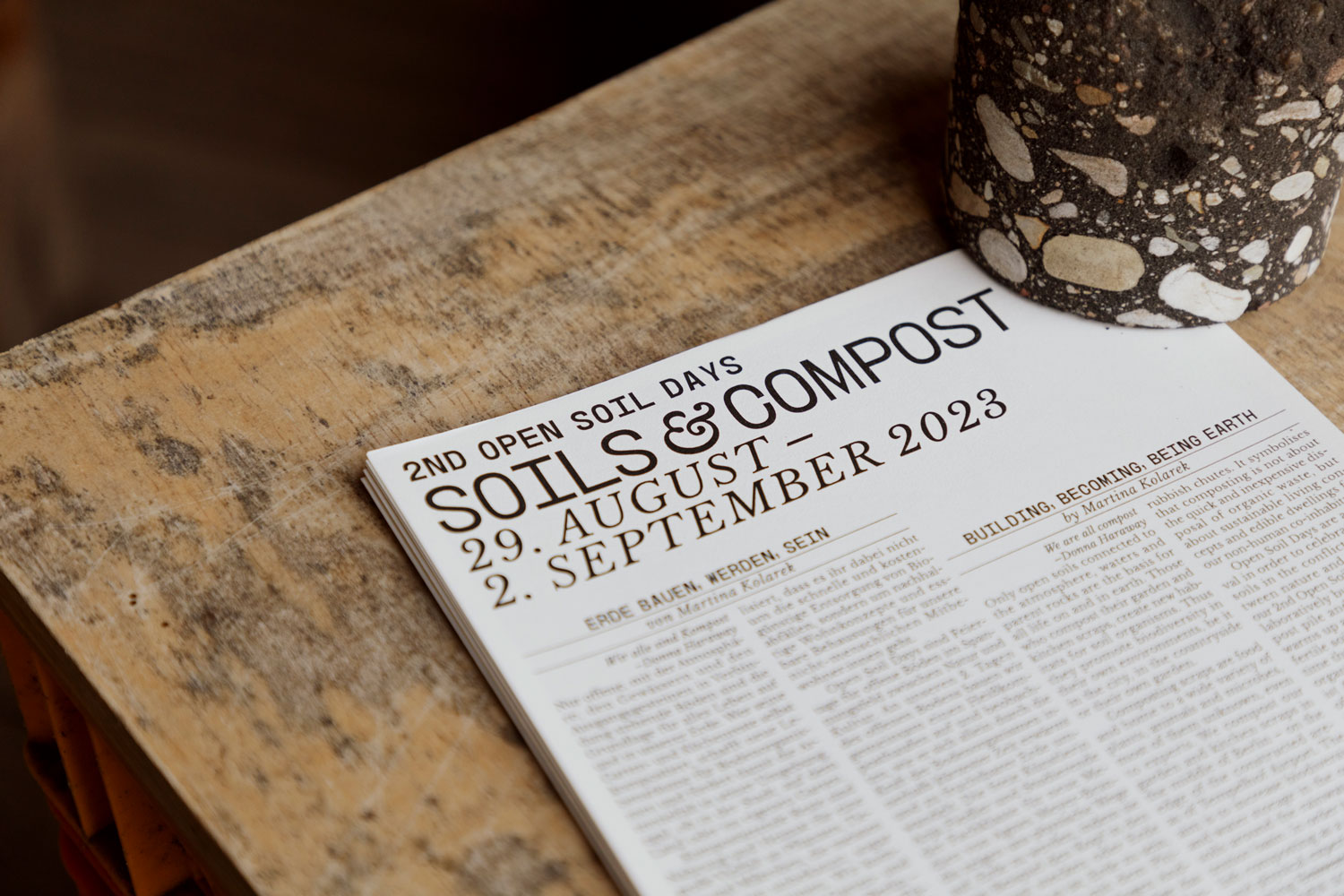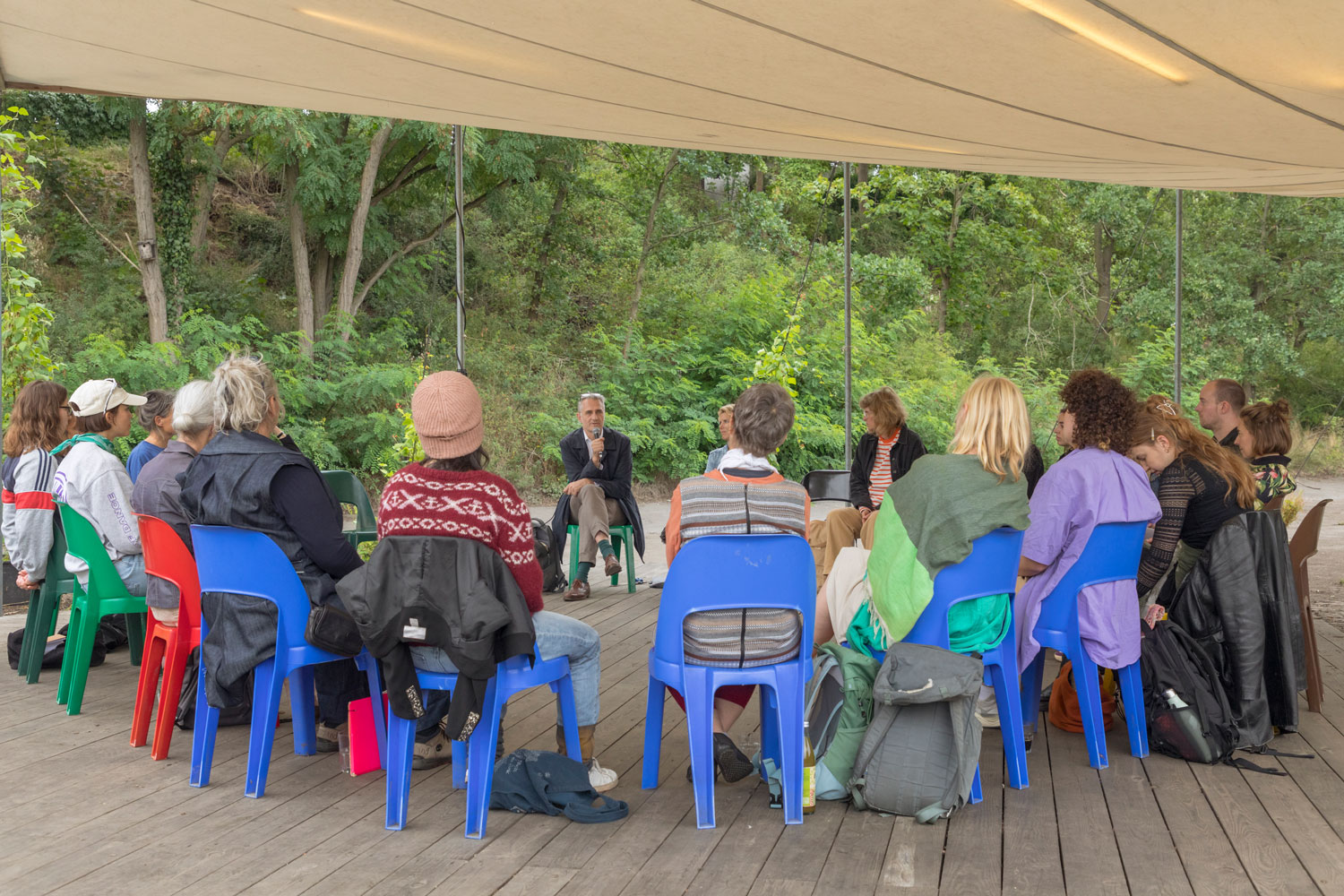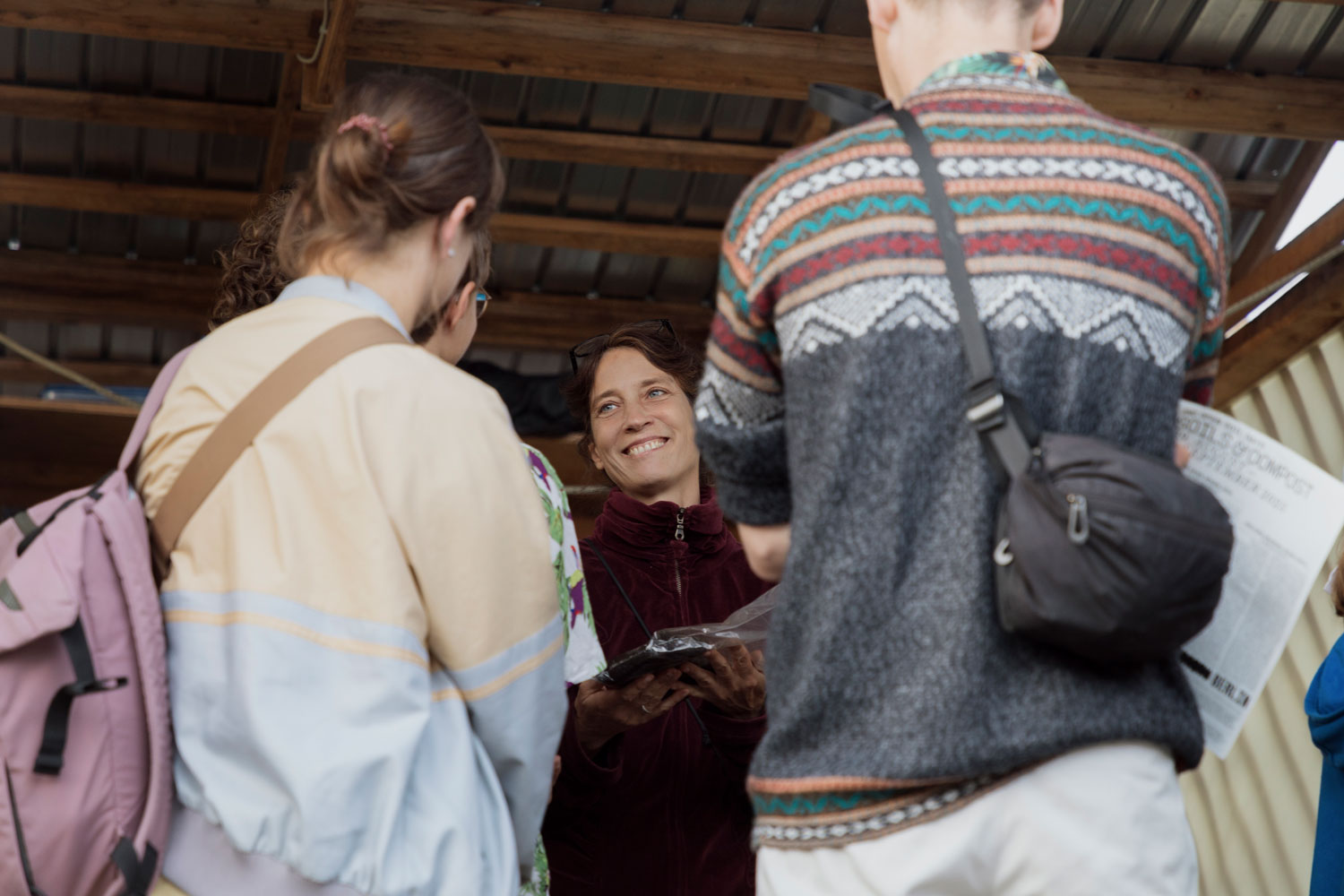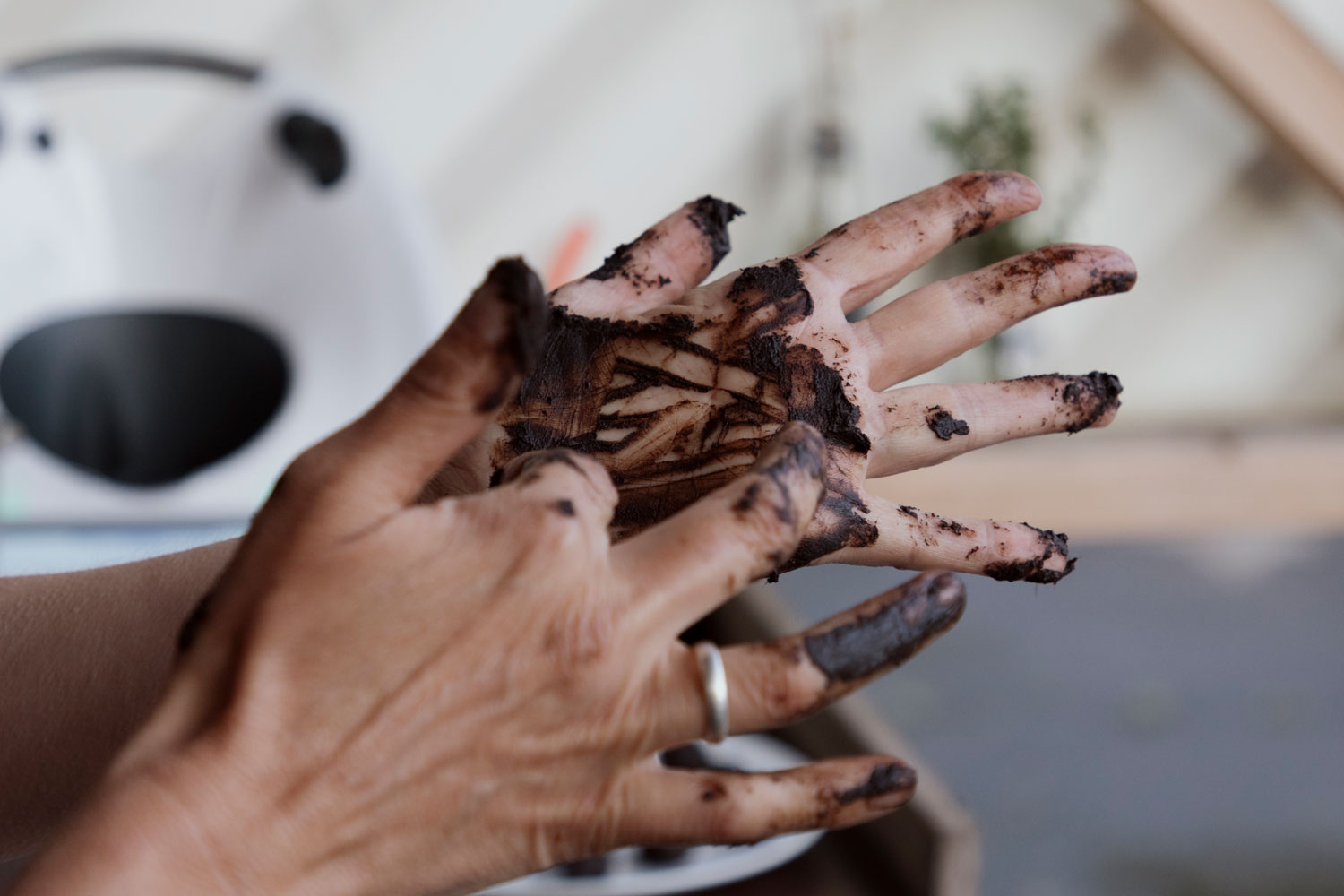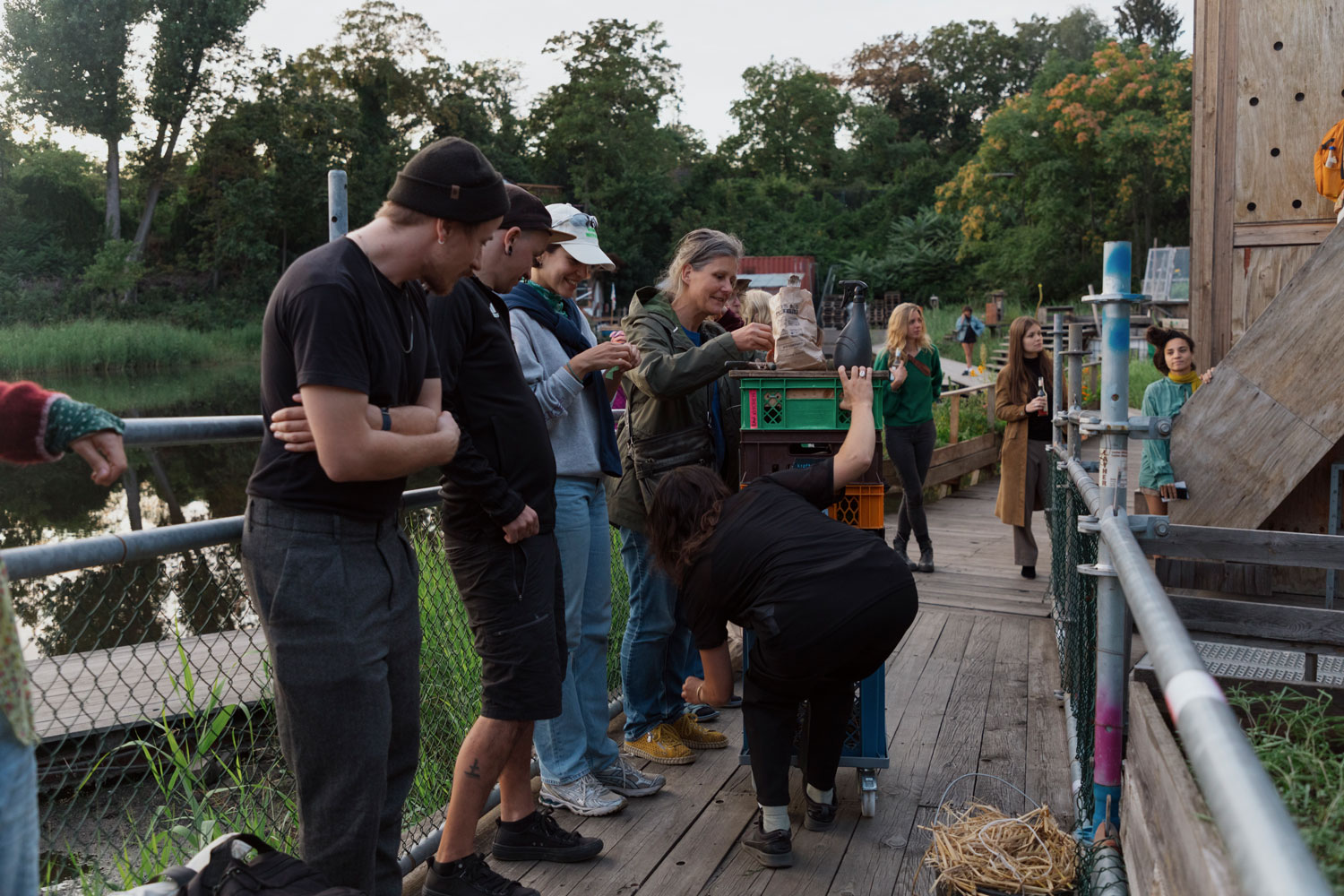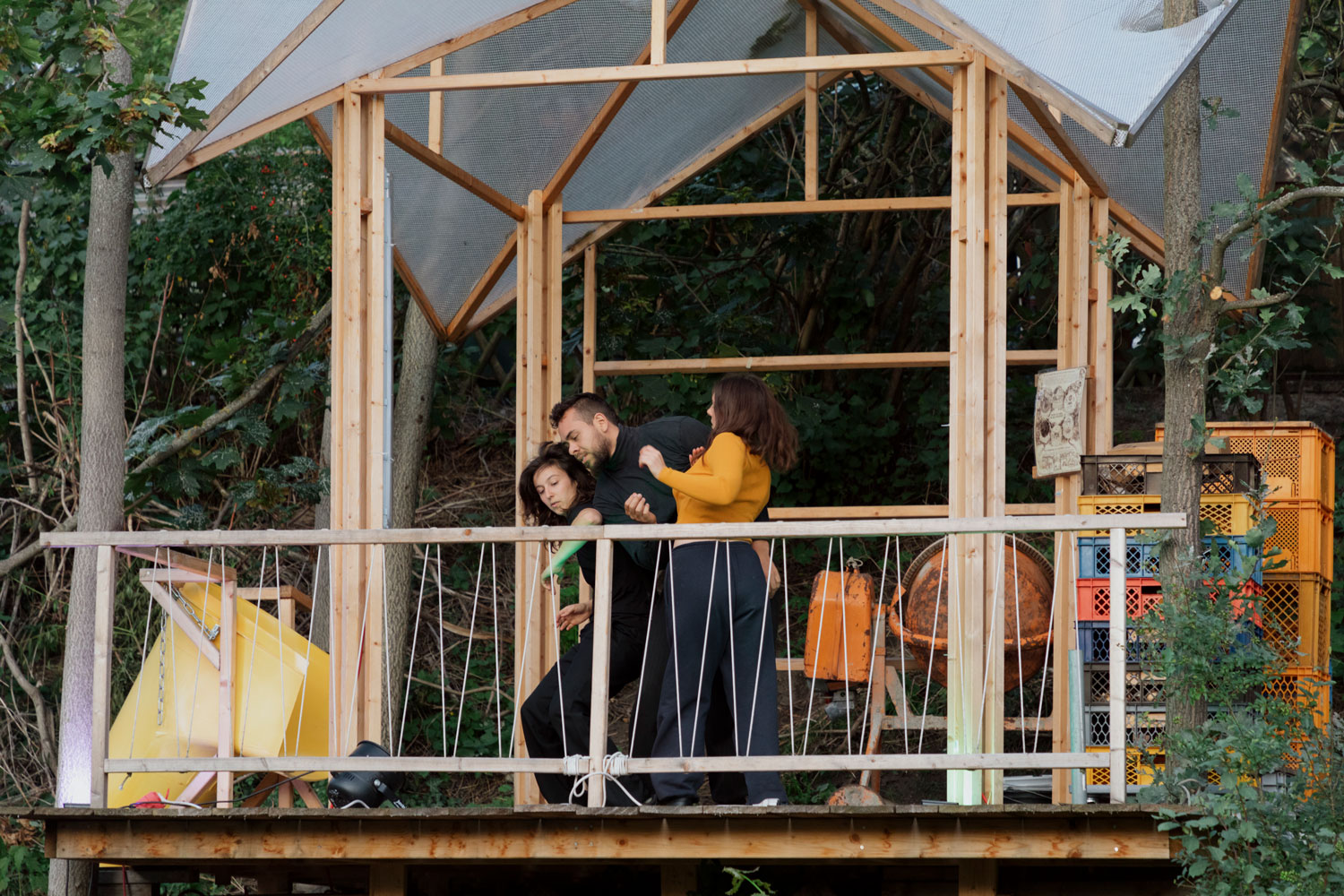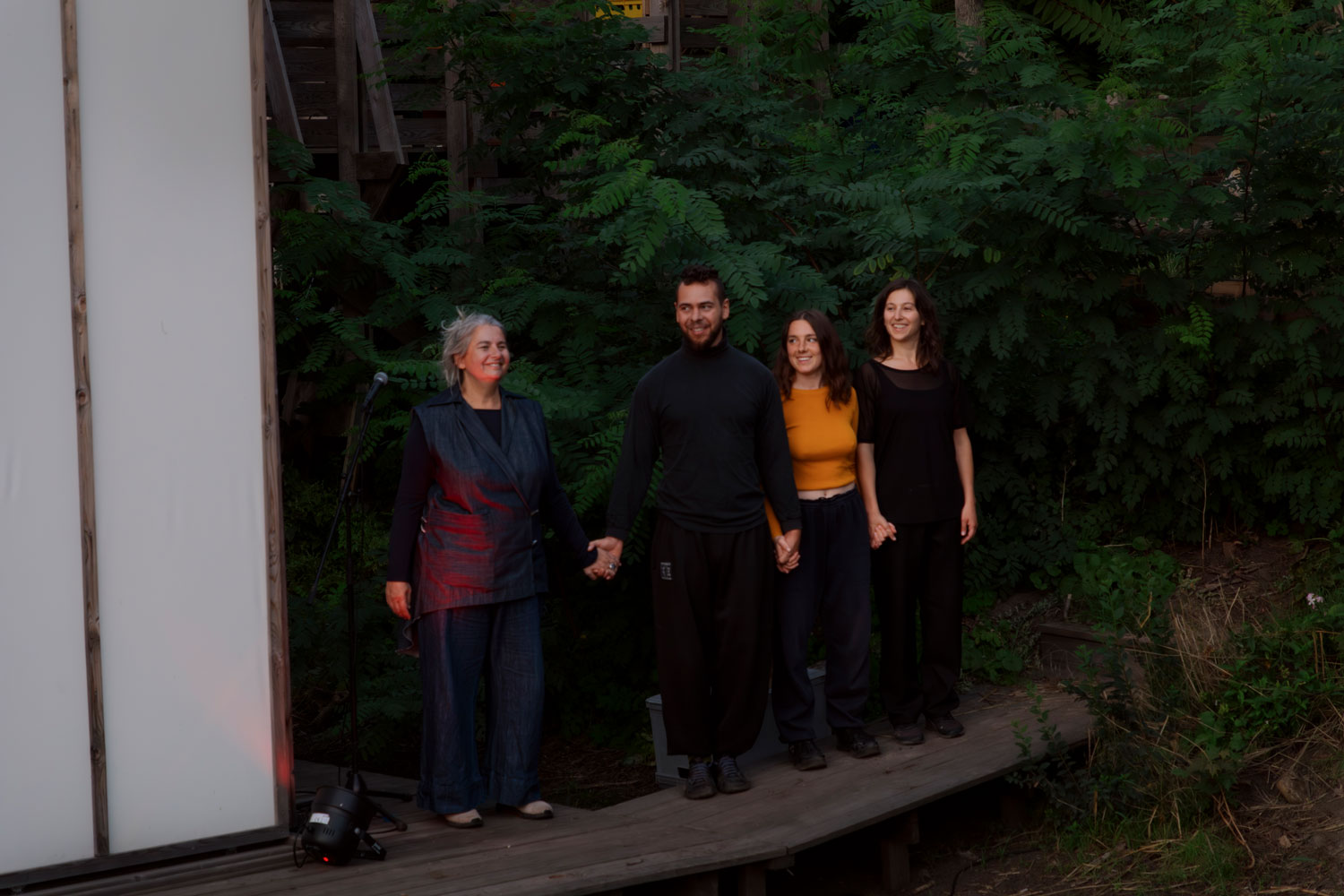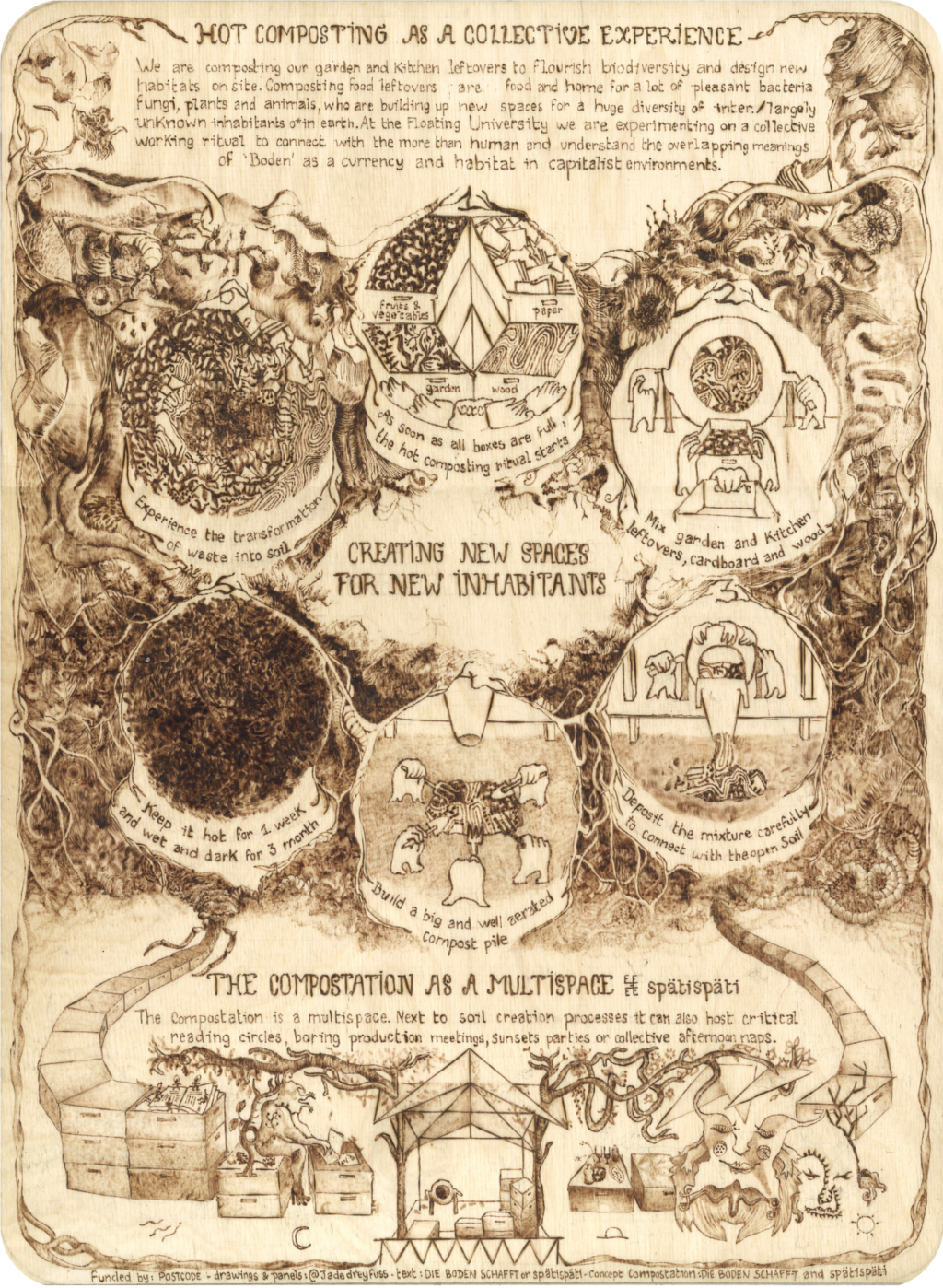2nd Open Soil Days: Soils & Compost
Curated by Martina Kolarek
BUILDING, BECOMING, BEING EARTH
by Martina Kolarek
We are all compost (Donna Haraway)
Only open soils connected to the atmosphere, waters and parent rocks are the basis for all life on and in earth. Those who compost their garden and kitchen scraps, create new habitats for soil organisms. Thus they promote biodiversity in their own environments, be it in the city, in the countryside or their own garden.
Composting scraps are food and home to a wide variety of plants, animals and microbes, most of them unknown, even to experts. We compost our garden and kitchen scraps in the middle of Berlin – on the edge of the constructed areas of Tempelhof Airport. The aim is to increase biodiversity and water storage in the open soils around the rainwater retention basin. In order to establish composting as a collective and physical experience in the Floating University, last year DIE BODEN SCHAFFT built a compost station with young architects from the spätispäti collective and volunteers for collecting, mixing and lingering. The facility consists of mobile and aerated collection bins, a concrete mixing machine and rubbish chutes. It symbolises that composting is not about the quick and inexpensive disposal of organic waste, but about sustainable living concepts and edible dwellings for our non-human co-inhabitants.
Open Soil Days are a festival in order to celebrate open soils in the conflict area between nature and culture. At our 2nd Open Soil Days we collaboratively build a hot compost pile and observe how it warms up and transforms into fertile soil within a very short time through the power of soil organisms only. Freelance artist Anja Fiedler and students of Agnes Meyer-Brandis’ new media class show us new ways of becoming earth, for example by sticking their heads in the compost or eating earth. We will explore what it is like to be earth with philosopher and biologist Andreas Weber, who says that the secret of the interconnectedness of all living creatures lies in earth itself. Finally, we will introduce the actions needed to build a hot compost pile and connect with the place and its diverse creatures.
The day ends like any good compost day: in good company and with fresh drinks !
Program
- All sessions are free of charge, donations are always welcome.
- Languages: Andreas Weber and Martina Kolarek (English), Anja Fiedler (German)
- All cultures, bodies and educations are welcome!
Registration
Please send us an email to open-soil-days-2023@googlegroups.com and indicate, which encounter you would like to attend.
There is plenty of space for humans, but a limited number of participants for certain sessions. Until 28 August we will inform you as soon as a session is overcrowded. Please cancel before, if you cannot attend, so that the place can be given to someone else. Thank you!
29 August, Building Earth
Hot Composting as a Collective Experience
2-7pm, Compostation, Workshop
To ensure that the compost is really hot on 2 September, we will build up a large compost heap a few days before. Organic hot composting is a centuries-old process passed down orally by women over generations and used all over the world. In Germany it was first written down by educated nuns. Unlike the fermenting, pyrolysing or burning biowaste plants built in Germany today, it is also suitable for following generations, because it slows down climate change, keeps the water bodies clean and promotes biodiversity.
Martina Kolarek is a feminist and intercultural biochemist, soil scientist, author and artist. She studied Applied Ecology at the University of Natural Resources and Life Sciences and has been working on soils, compost and compostable materials for over 25 years. In 2014 she founded DIE BODEN SCHAFFT as a transdisciplinary platform for a new soil culture and science. In 2018, she published her book Kompostieren!, a richly illustrated guide to organic hot composting.
die-boden-schafft.de
2 September, Becoming Earth
Woodlouse, springtail and peat chocolates: a delicious journey into earth
4, 5 and 6pm (30 min), Sportshall, Workshop
Anja dives into the world of compost with you: Who lives there? How does it feel to have 4, 6 or 8 legs? How does it feel to live there? And what do compost inhabitants need to feel good? What delicacies are there for creepy-crawlies? Afterwards we will make a delicacy for ourselves: peat „chocolates“! Peat is a very different soil from compost. It consists of more than 350 plants that have been preserved in the moor because soil organisms cannot survive without air. You will be surprised how delicious these „chocolates“ are!
Anja Fiedler is a sustainable food artist and creates new relationships between city dwellers and their food with her art actions, “Stadt macht satt” and “Apfelschätze”. She mostly works with supposedly “worthless” but essential life resources. In the form of educational formats, city walk-eatings or installations | actions, she creates processes to participate in which everyone can re-evaluate life resources. Her work has received many awards.
anja-fiedler.de stadtmachtsatt.de apfelschaetze.de
Compost & Cosmos
3-8pm, Urban Forest, Ausstellung
We present selected works from students of the New Media class of Agnes Meyer-Brandis at the Berlin University of the Arts. In the summer semester of 2023, they not only dealt with the production and exploration of compost & cosmos theoretically or digitally, but also in a practical and physical way.
Philippe Hansen: I like to think that I can understand every cosmos by observing very closely
Photography of the performance on 16.5.2023 at the Floating University
Description: 5 min, very physical experience
Richard Ley: How to compost yourself
Plastic composter, organic material, historical movie
Description: move beyond the notion of a separate self and embrace the ecological kinship that binds us to the earth with all its critters and creatures
Agnes Meyer-Brandis is a Berlin-based artist and a visiting professor at the Berlin University of the Arts. With a background in sculpture and new media, she creates works on the fringes of science, fiction and imagination. Originally trained in mineralogy, she studied at the art academies in Maastricht, Düsseldorf and Cologne and founded the Research Raft, a fictitious Institute for Art & Subjective Science. Meyer-Brandis’ work has been exhibited worldwide and has received many awards.
ffur.de onetreeid.de urbantrees.net teawithatree.com
2 September, Being Earth
Being Earth. A Humanism of Participation
4-7pm, Auditorium, Lecture, Workshop
Our civilization finds it difficult to develop an idea of participation in the living biosphere. The Western mainstream view understands individuality as separateness and not as blossoming of the whole. In this lecture I want to look at ways through which we can find our existence as part of a flourishing whole within our experience. Our body is already in constant connection with all other living bodies, with the waters, and with the mineral body of the planet. Also emotionally, we experience ourselves as interwoven into a living whole. Only our mainstream culture does not take these facts into account. It is therefore important to remember, that the earth is a body in which we continuously participate. Earth is the secret of individuality through connectedness. As Gaia, it is a biosphere shared by all beings. These beings – like ourselves – ultimately participate in one infinite, living swarm, in one “flesh of the world” (Maurice Merleau-Ponty).
Andreas Weber is a biologist, philosopher, and nature writer. He focuses on a re-evaluation of our understanding of the living. He proposes to view – and treat – all organisms as subjects and hence the biosphere as a meaning-creating and poetic reality. Andreas teaches at the University of the Arts, Berlin and at Bard College Berlin. He is a visiting professor at the UNISG, Pollenzo, Italy. He contributes to major German newspapers and magazines and has published more than a dozen books. His most recent publications in the English language are Enlivenment. A Poetics for the Anthropocene, MIT Press, 2019 and Sharing Life. The Ecopolitics of Reciprocity, Boell Foundation, 2020.
biologyofwonder.org
Build me a land on sand
7:30-8pm, Compostation, Performance
Rituals are actions that are firmly integrated into our everyday life and are meant to help us direct our thoughts to those things that are really important. Rituals give us the possibility to follow a certain dramaturgy and rhythm with our bodies, which only opens up through our own participation, the active doing and acting in the common process. In this ritual dance and song performance, we present those repetitive actions that are necessary to build a hot compost at the Floating University and to connect with the place and its inhabitants; as a prerequisite for entering into living relationships and, with a little practice, being earth.
Martina Kolarek is a feminist and intercultural biochemist, soil scientist, author and artist. She studied Applied Ecology at the University of Natural Resources and Life Sciences and has been working on soils, compost and compostable materials for over 25 years. In 2014 she founded DIE BODEN SCHAFFT as a transdisciplinary platform for a new soil culture and science. In 2015 she composed the song “Der Reigen”, which acts as the basis for the dance performance.
die-boden-schafft.de
in cooperation with:
KunstKartell is a non-profit, interdisciplinary association. KunstKartell connects artists from a wide variety of fields who share a socio-political aspiration in their works. KunstKartell stands for interdisciplinary cooperation, networking, exchange of resources as well as being and working together in solidarity. Dancers: Alena Trapp, Luis Stängl and Camille Larroque
kunstkartell.de
Heike Ebner is a Berlin artist, who produces workwear for craftspeople and fashion from sustainable fabrics with her label FLORINDA SCHNITZEL. She designed the first composting suit and sewed it from compostable fabrics.
florindaschnitzel.de
2 September, Celebrating Earth
Floating Get Together
7-10pm
Our bar at the Floating University usually opens on infamous „Thirsty Thursdays“ only. But for special occasions, Hannah Lu and her team will be open as well. We are looking forward to it!
